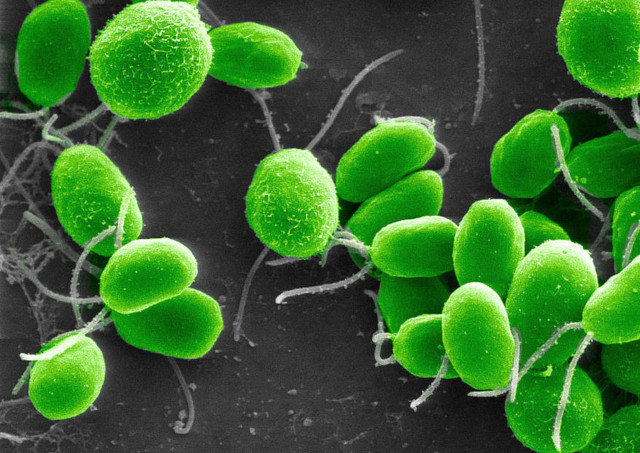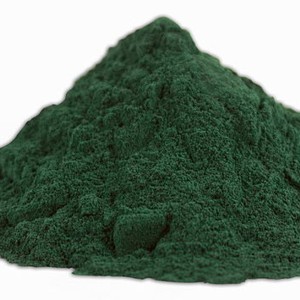One of the most studied micro-organisms in the world – Chlamydomonas reinhardtii – has never been studied in its potential role as a therapeutic food. Until now. And it turns out that the multi-talented plant may be helpful to folks with irritable bowel syndrome and related issues…
 C. reinhardtii: This microscopic photo shows individual C. reinhardtii cells
C. reinhardtii: This microscopic photo shows individual C. reinhardtii cells
in their natural state. This plentiful Algae and others may hold the
key to feeding a world in 2050 with 10 billion people…
C. reinhardtii has been used in the lab for decades as a model in studies as diverse as algae-based biofuels to plant evolution. It’s role is similar to that of mice in animal studies. It’s also known that other Algae contain beneficial oils, vitamins, proteins, carbohydrates and antioxidants. That’s why they appear in the ingredient lists of so many ‘neuticeutical’ products. But the benefits from consuming C. reinhardtii were never explored until a team at the University of California at San Diego (UCSD) decided to look closer.
What they did
According to an abstract of the study report, preliminary data in mouse studies demonstrated that consuming C. reinhardtii significantly reduced the rate of weight loss in mice with acute colitis, which is generally linked to inflammation of the digestive tract. Building off these results, the researchers set out to test for a similar effect when the algae was consumed by human volunteers, including those with and without symptoms associated with IBS.
Volunteers consumed daily spoonfuls of powdered C. reinhardtii biomass (see photo, top of page) and reported their gastrointestinal health for one month. Of the hundreds of interested participants in the project, data from 51 volunteers met the study’s requirements for inclusion in the final data analyses.
What they found
“The benefits of consuming this species of algae were immediately obvious when examining the data from both mice and humans who suffered from gastrointestinal symptoms,” said Dr. Frank Fields, Lead Author of the paper. “I hope that this study helps destigmatize the thought of incorporating algae and algae-based products into your diet — it is a fantastic source of nutrition and we have now shown that this species of algae has additional benefits to animal and human health.”
The takeaway
Principal investigator and Algae expert Dr. Stephen Mayfield explains: “This is exciting because it demonstrates a clear benefit: If you have IBS-like symptoms, [C. reinhardtii] is good for you.”
My take
Mayfield’s findings are just the tip of a green, slimy iceberg representing the proven and potential benefits of Algaeculture.
I first encountered the idea of Algae-as-food back in 2014, when I posted a story about Spirulina, a common Algae that some boosters say could help the world meet the challenge of feeding 10 billion people by 2050. Folks quoted in a Business Insider report I read called it, “one of the most nutritious foods known to man.”
Robert Henrickson, CEO of Smart Microfarms which grows Algae commercially, shared his vision in Algae Industry Magazine of a future world in which Algae are everywhere, generating power and oxygen, feeding us, and medicating us.
Maybe it’s time more scientific and technical development attention was given to Algae. I rather enjoy the notion that such an effort could radically change the whole concept behind the phrase ‘going green’…
~ Maggie J.

